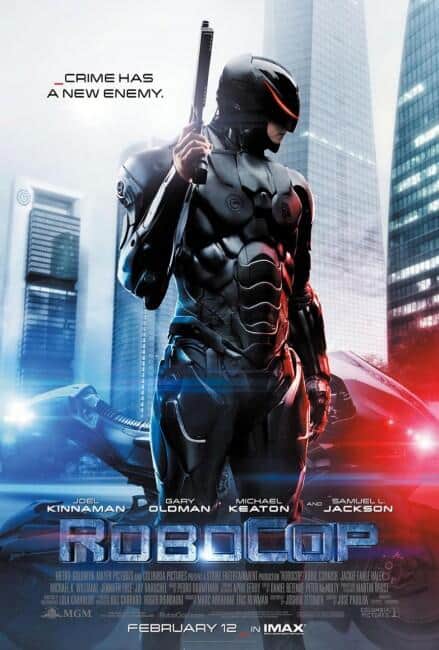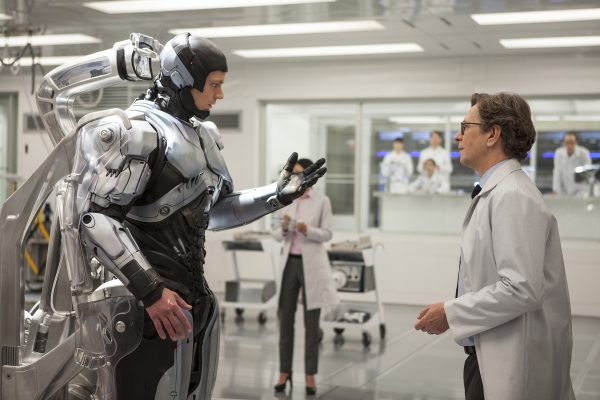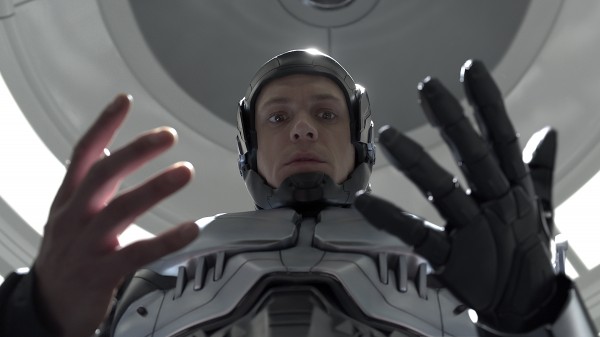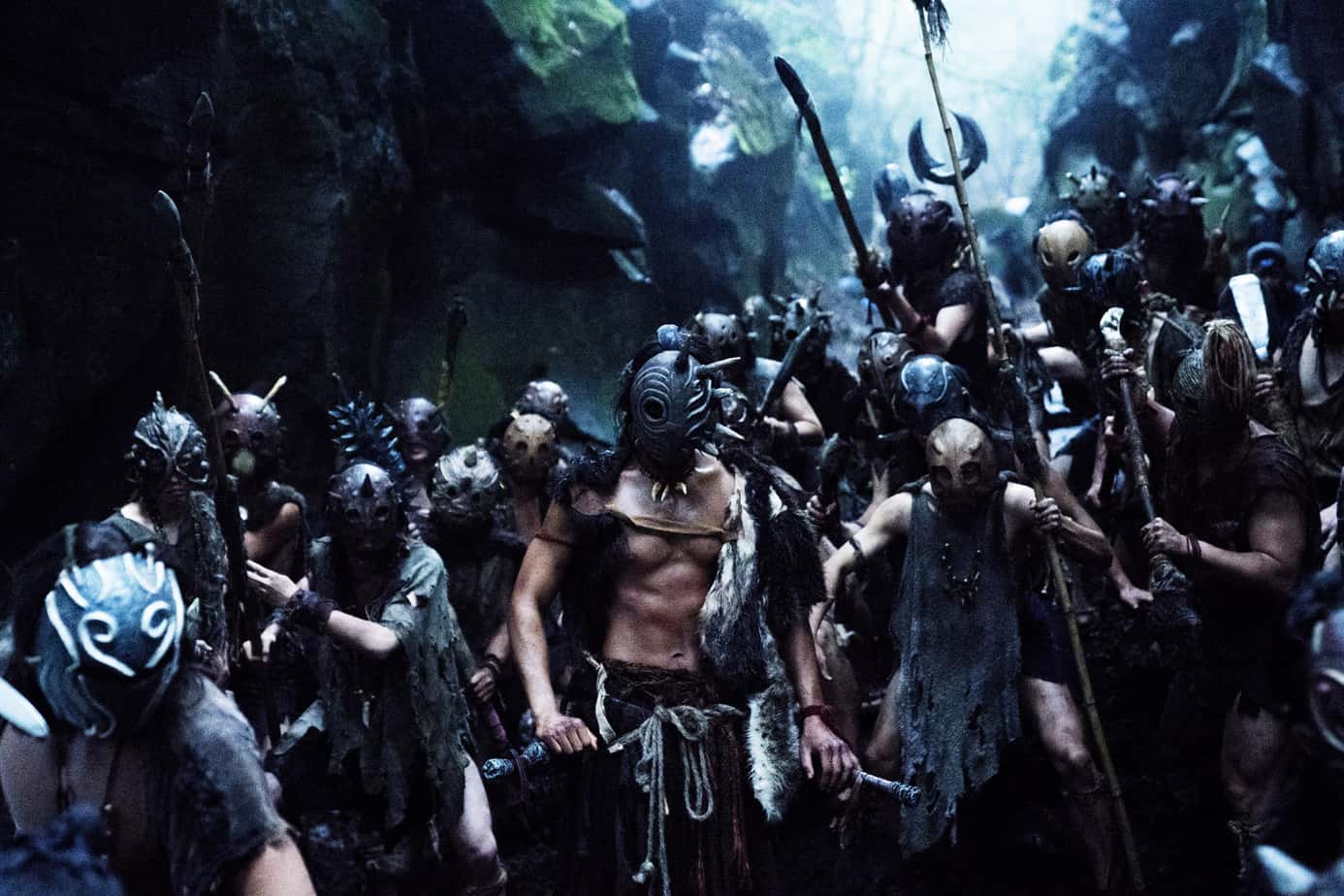
Movie Review: ‘ROBOCOP’ (2014)
[youtube id=”xPLSpmAtc1Q” width=”600″ height=”350″]
Disclaimer: I will be spending the first few paragraphs discussing Paul Verhoeven’s 1987 film ‘Robocop’ to not only establish my position and declare fandom for the original film but also to show you that unlike some other reviewers, I have no problem disassociating the 2014 film from its original source material to respect it as its own film.
Robocop (2014) is not going to be a easy pill to swallow for some. With the original Paul Verhoeven film being more than a fantastic film, it became a pop culture icon. You’d be hard pressed to find anything today with an R rating (excluding the X/NC-17 rated cut) being adapted to market to kids via toys and even a cartoon. The only thing that comes close to what the character of Robocop was in the late 80’s was The Toxic Avenger. Even then, Toxie wasn’t on the same level as Robocop.
[youtube id=”l2gfvvb2gmg” width=”600″ height=”350″]
Already, José Padilha‘s Robocop has a lot stacked against it. Before I dive into this, let’s set our expectations. I’m a huge fan of the Verhoeven film and as long as this new reincarnation wasn’t a straight up remake, I was all ears/eyeballs. While this review might have my own commentary on the original, I only want to do this in defense of what I think is a decent film that will, very likely, not get its fair shake. Robocop (1987) works on so many levels because of a multitude of reasons. One of them being the man fact that that the script and its ideas were in process for almost half a decade before it was committed to film. Society in the 80’s changed quickly. At the beginning of that decade, people who had a disregard or neglect to society were seen as anarchistic punks. By the end of the decade, those same personalities were drenched in greed and personal gain masked by a facade of societal contribution. This is evident in the cops threats of striking against the police force that employees them to the greed and the threat of change that Bob Morton posed towards Dick Jones. I’ll save you from the other observations made towards the film in regards of satire, violence and sensationalism because I’m sure you have already heard them. Needless to say, this new adapatation/reimagining does things that touches on some of those themes but explores other territories that might seem more conventional and Verhoeven’s film was anything but conventional. For that, this film might not be for you. With that said, lets dive into it.
 The 2014 version of the film focuses more on internal police corruption and pacifying public concern over the moral decision making by military robotics deployed by Omnicorp. The film mainly focuses on Alex Murphy (Joel Kinnaman) and how he adapts to his new lifestyle. It is handled differently than the original film. In this film, he is told right off the bat what happened and they try to suppress his naturalistic reactions to the very traumatic event in his life. Murphy doesn’t get a memory reboot, more or less he is in a coma from the the failed hit put out on him and can only be equated to going to sleep as a human and waking up as something he doesn’t quite understand. Helping him along the way is Dr. Norton (Gary Oldman). Norton is pretty much the character of the audience. He is brought in against his will by Raymond Sellars (Michael Keaton), CEO of OmniCorp, to assist in hopes of monetary gain to further his non-military research. Stuck in the middle of this is Murphy’s wife, Clara (Abbie Cornish), who signed off on donating Alex’s body (what was left of it) and mind to OmniCorp for one more chance to be with her husband.
The 2014 version of the film focuses more on internal police corruption and pacifying public concern over the moral decision making by military robotics deployed by Omnicorp. The film mainly focuses on Alex Murphy (Joel Kinnaman) and how he adapts to his new lifestyle. It is handled differently than the original film. In this film, he is told right off the bat what happened and they try to suppress his naturalistic reactions to the very traumatic event in his life. Murphy doesn’t get a memory reboot, more or less he is in a coma from the the failed hit put out on him and can only be equated to going to sleep as a human and waking up as something he doesn’t quite understand. Helping him along the way is Dr. Norton (Gary Oldman). Norton is pretty much the character of the audience. He is brought in against his will by Raymond Sellars (Michael Keaton), CEO of OmniCorp, to assist in hopes of monetary gain to further his non-military research. Stuck in the middle of this is Murphy’s wife, Clara (Abbie Cornish), who signed off on donating Alex’s body (what was left of it) and mind to OmniCorp for one more chance to be with her husband.
 Padilha’s vision might be a little muddy but his ideas are just what this film needed. He finds a way to adapt this story to make it more resonate with modern society. Satire is evident in lines spoken by the characters as well as through “The Novak Element”, a Fox News-esque program hosted by Pat Novak (Samuel L. Jackson) – the opening of the film with MGM lion is classic & bold for this film. Social commentary is pretty evident in this interpretation without being coated with that pitch black shine that Verhoeven treated the original with. Padilha’s political and social outlook is refreshing (please see his Elite Squad films) and welcome. Whether you like it or not, he pays homage to the original film as well. The film’s final act does fall apart at the seams a bit, mainly by becoming a bit pedestrian, however the fact that this could have been just another remake that did nothing new but didn’t should be commended. The scene when Norton reveals what is left of Murphy’s body is pure horror and really shows off Kinnaman’s ability to portray the feeling of helplessness. More importantly, what Kinnaman does in this scene is make a connection with the audience. The rest of the cast, aside for the actual villain and his police cronies whom are forgettable, does an above average job with their performances. It’s nice to see Keaton step into a role that makes us question whether his actions are good or bad.
Padilha’s vision might be a little muddy but his ideas are just what this film needed. He finds a way to adapt this story to make it more resonate with modern society. Satire is evident in lines spoken by the characters as well as through “The Novak Element”, a Fox News-esque program hosted by Pat Novak (Samuel L. Jackson) – the opening of the film with MGM lion is classic & bold for this film. Social commentary is pretty evident in this interpretation without being coated with that pitch black shine that Verhoeven treated the original with. Padilha’s political and social outlook is refreshing (please see his Elite Squad films) and welcome. Whether you like it or not, he pays homage to the original film as well. The film’s final act does fall apart at the seams a bit, mainly by becoming a bit pedestrian, however the fact that this could have been just another remake that did nothing new but didn’t should be commended. The scene when Norton reveals what is left of Murphy’s body is pure horror and really shows off Kinnaman’s ability to portray the feeling of helplessness. More importantly, what Kinnaman does in this scene is make a connection with the audience. The rest of the cast, aside for the actual villain and his police cronies whom are forgettable, does an above average job with their performances. It’s nice to see Keaton step into a role that makes us question whether his actions are good or bad.
 In the end, 2014’s Robocop is not the misfire that everyone was expecting or maybe even hoping for. That’s not to say that it comes close to the level that Verhoeven’s film accomplished. They are separate films and should be treated as such. If you keep your mind open and go in expecting a different take on the basic story you know, I think you will be pleased.
In the end, 2014’s Robocop is not the misfire that everyone was expecting or maybe even hoping for. That’s not to say that it comes close to the level that Verhoeven’s film accomplished. They are separate films and should be treated as such. If you keep your mind open and go in expecting a different take on the basic story you know, I think you will be pleased.



